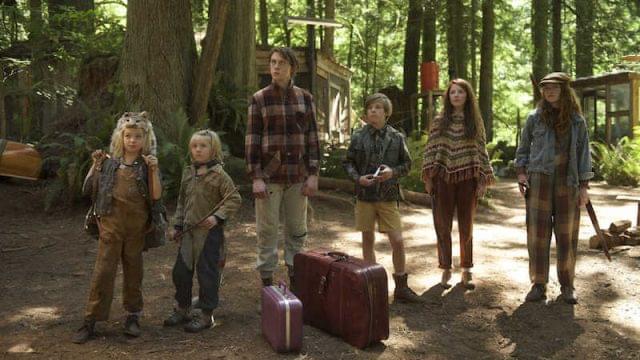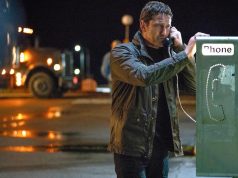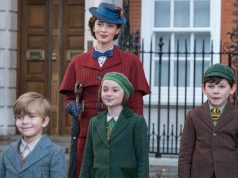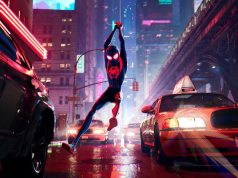
It says something about the charm of “Captain Fantastic” that I was able to enjoy it despite either rolling my eyes or frowning in disapproval at most of the main character’s parenting choices. I think he’s wrong a lot, but most (not all) of his wrongness comes from love for his children, not from self-interest. You can understand him even if you disagree with him.
He is Ben (Viggo Mortensen), a well-educated off-the-grid survivalist who lives in the Pacific Northwest woods with his wife and their six children, ages 5-ish to 18-ish, who have the following made-up names: Bodevan, Kielyr, Vespyr, Rellian, Zaja, and Nai. You’d assume they are Mormons from Idaho, but no: these are the anti-religion, anti-medicine, anti-capitalism types of rugged home-schoolers, not the religious-fundamentalist kind.
Ben teaches them combat skills and gives them weapons as gifts (bows, arrows, knives — no guns), while also providing a thorough education in philosophy, literature, and language. Self-reliance is the goal. When Rellian (Nicholas Hamilton), who must be about 14, injures himself while rock-climbing, Ben refuses to help him to safety, to teach the lesson that you can’t assume someone will always be there to assist you. Ben isn’t wrong about that, but yeesh.
Anyway, we never meet Ben’s wife. Her parents (Frank Langella and Ann Dowd) have already whisked her away to a hospital when the film begins, Ben having relented on his distrust of doctors this one time, and she dies soon thereafter. Her parents resent Ben for taking their daughter and grandchildren into the boonies, and now they want custody of the kids, deeming Ben an unfit parent. (Their names alone are evidence of this.)
On top of that, Ben must grapple with his children’s emerging sense of independence. The very principles he’s taught them means they might choose not to live this way anymore once they come of age. Rellian is already leaning toward wanting to rejoin society. The oldest, Bodevan (George MacKay), generally supports Ben, but he wants to go to college. When the family road-trips to see Ben’s sister (Kathryn Hahn), her husband (Steve Zahn), and their two couch-potato sons, Ben’s children see firsthand how he reacts to people whose lifestyles are different from his: with smug condescension and open hostility. This, while he excuses his own bad acts — like teaching the kids how to shoplift — through his “father knows best” rationalization.
Writer-director Matt Ross (who plays tech guru Gavin Belson on HBO’s “Silicon Valley”) shows the good and bad of Ben’s parenting philosophy without judgment (unlike me). There are areas where the kids are objectively healthier and smarter than their suburbanite cousins, and other areas where their isolation from the world has made them worse off. The key to the film’s success is that Ben begins to realize this. As Ross sympathetically depicts Ben’s regrets, fears, and learning process, Viggo Mortensen gives a fully developed performance as a man whose certainty that he’s always right is beginning to crumble.
In the end, Ben finds a middle ground where the family can live by certain principles while still functioning in the real world. It’s a thoughtful conclusion to a multi-layered, gently (and not-so-gently) humorous film that forces us as viewers to consider our own beliefs.
B (1 hr., 58 min.; )





